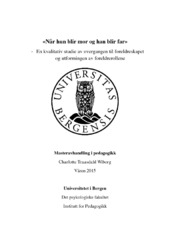Når hun blir mor og han blir far. En kvalitativ studie av overgangen til foreldreskapet og utformingen av foreldrerollene
Master thesis
Permanent lenke
https://hdl.handle.net/1956/15983Utgivelsesdato
2015-06-23Metadata
Vis full innførselSamlinger
- Department of Education [296]
Sammendrag
Becoming parents involve not only conceiving and giving birth to a child; it also involves becoming and being a parent. The study Når hun blir mor og han blir far" (English: «When she becomes a mother and he becomes a father») explores this issue. A qualitative research design has been used to explore the research question, and nine first time parents in Norway have been interviewed through the process. The purpose of this study was to get an insight in the thoughts, experiences and feelings first time parents have through the transition to parenthood and the shaping of their parental roles. Through the analysis several themes on these thoughts and experiences appeared. The analysis is theme based approach together with an interpretive approach. The themes that came forward through the analyzed interviews were: expectations and experiences, changes in the love relationship, a new everyday life with a little boss and loss of time and freedom. The study is built on a social constructivist approach, where Berger and Luckmann's theory on the construction of reality constitutes the basic understanding. Perspectives on learning, cultural scripts and the concept of habitus" by Bourdieu, together with perspectives on the understanding of gender in parenthood, constitute the analytical perspectives used to understand the material from the interviews. The results show homogeneity and the main results show that cultural scripts constitute the basis on what the first time parents build their understanding of parenthood on. The participants are concerned about being good enough parents, and for them this means taking in to account the child's wants and needs, and having a close and emotional relation to the child. The participants experience parenthood where the mother still is the one who wants and takes most of the control and where the father is criticized by the mother. But the father role the participants describe is a role that resembles a maternal role that mothers have had for a long time. The father as a breadwinner is no longer recognized the same way as earlier. The understanding of what a child is and needs characterizes the understanding of what a good parenthood is, and it also characterizes the content of both the maternal and the paternal roles. What is viewed like the child's best interest is the core of the shaping of both. Å bli foreldre innebærer ikke bare å unnfange og føde et barn, det innebærer også utøvelsen av foreldreskapet og utforming av foreldreroller. Avhandlingen «Når hun blir mor og han blir far» dreier seg om nettopp dette. Studien bygger på en kvalitativ intervjuundersøkelse med 9 førstegangsforeldre i Norge. Hensikten med studien har vært å få innsikt i foreldrenes tanker, erfaringer og følelser knyttet til deres overgang til foreldreskapet og utformingen av foreldrerollene. Gjennom analysearbeidet kom det fram ulike temaer som foreldrenes tanker og erfaringer var knyttet til. Analysen av materialet er gjennomført ved hjelp av en temabasert og en meningsfortolkende tilnærming. Temaene som kom fram de analyserte intervjuene var: forventninger og erfaringer, kjæresterelasjonen i endring, ny hverdag med en liten sjef og tap av tid og frihet. Undersøkelsen bygger på en sosialkonstruktivistisk tilnærming, og Berger og Luckmanns teori om konstruksjonen av virkeligheten utgjør grunnforståelsen i studien. I tillegg til denne forståelsen utgjør perspektiver på læring, kulturelle skript og Bourdieus habitusbegrep sammen med perspektiver knyttet til forståelsen av kjønn i foreldreskapet, de analytiske perspektivene som er brukt for å belyse deltakernes fortellinger og studiens problemstilling. Resultatene viser stor grad av homogenitet i deltakernes fortellinger. Hovedfunnene viser at kulturelle skript og fortellinger ligger til grunn for hvordan deltakerne presenterer sin forståelse av foreldreskapet. Deltakerne er opptatte av å være gode foreldre, noe som de mener innebærer å ta hensyn til barnets ønsker og behov, og å ha en nær og emosjonell relasjon til barnet sitt. Deltakerne forteller om et foreldreskap der mor fortsatt er den som både ønsker og tar mest kontroll, og far ofte havner i mors kritiske lys. Men den farsrollen deltakerne forteller om, er en rolle som ligner mer på den rollen mor lenge har hatt. Forsørgerfaren er lenger ikke like aktuell som han tidligere har vært. Synet på og forståelsen av barnet preger både forståelsen av hva «det gode foreldreskapet» skal inneholde, og i tillegg preger det innholdet i både mors- og farsrollen. Barnets beste står i sentrum i utformingen av begge rollene.
